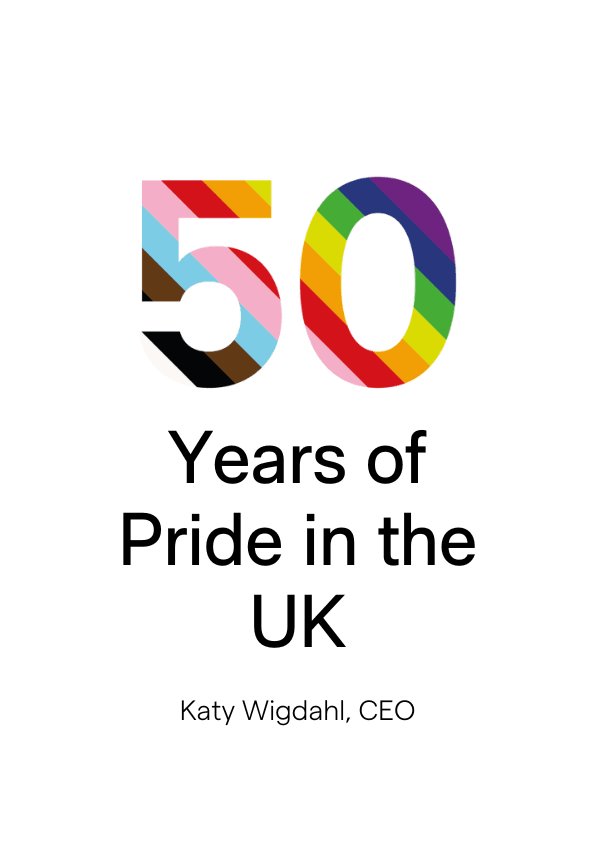- Blog
- 50 Years of Pride in the UK
Jun 15, 2022 | Read time 4 min
50 Years of Pride in the UK
To celebrate 50 years of PRIDE in the UK, our CEO, Katy Wigdahl looks at the advancements overcome – and obstacles still faced – by the LGBTQ+ community.
June 2022 has been quite the month for celebrations. Gatherings and get-togethers for the Queen’s Platinum Jubilee, honoring 70 years of Elizabeth II’s reign, were held in the UK and around the world. Now, we’re deep into the heart of Pride month, which celebrated 50 years in the US in 2020. This year sees 50 years of Pride in the UK.
How Far We’ve Come
Beginning as a reaction to the Stonewall riots in New York on 28 June, 1969, the first Pride march was on the anniversary of this event twelve months later. The ripple effect was immense and within a few years, gay rights organizations were founded globally – with pride marches the symbol of the unity they were striving for.
The world was a different place when the first UK Pride March took place across London on 1 July 1972. There were approximately 2,000 participants on that day. By 1992, that number had increased to 100,000. In 2019, before the pandemic, an estimated 1.5 million people came to London to show their support for all members of the LGBTQ+ community. Looking at those numbers, there’s much to celebrate.
Last month, Jake Daniels became the UK’s first active male professional footballer to come out publicly as gay. With 72 teams in the English leagues and about 25 players in each team, it doesn’t take a great mathematical mind to work out that 1 in 1,800 players coming out as gay isn’t quite indicative of the nation as a whole. With 2.1% of British adult males identifying as gay, it’s clear the sport still has a way to go before footballers can feel comfortable being themselves. Jake’s courage is a start.
Keep Moving Forward
Every year the International Lesbian, Gay, Bisexual, Trans, and Intersex Association Europe (ILGA-Europe) reveals its rainbow benchmarking tool. In it, they pinpoint which countries are making progress and which are falling behind in terms of full equality and human rights for all.
Much of the kudos has been handed to Denmark, jumping up to second place. The reason for the country’s high position is down to its equal treatment law, covering health, education, employment, and services. Making sexual orientation and gender identity aggravating factors in hate crimes has also played a large factor.
Other countries highlighted as making steps in the right direction include Iceland, Germany, and France for reasons as varied as bringing in legislative recognition of trans parenthood (Iceland), banning intersex genital mutilation (Germany) and banning ‘conversion therapy’ based on sexual orientation and gender identity.
As a UK-based company, it was a little disappointing to see the UK fall down the list, scoring 53 out of 100 on the rainbow benchmarking tool. While being number 14 out of 50 still places the UK highly, it’s the drop that is discouraging. This decline is predominantly attributed to the fact that the government’s equality body is not, as set out in its mandate, effectively protecting its population on the grounds of sexual orientation and gender identity. Add to this the sad truth that there’s little movement on long-promised reforms on gender recognition – and banning so-called ‘conversion therapy’ for all – and it’s clear there’s more to be done.
There’s more positive news outside of Europe too. 2022 has seen Chile make same-sex marriage legal, joining thirty other countries around the world. This is seen by many as great progress as the country has been viewed as quite a conservative part of the world, struggling for decades to pass the law. Chile now joins Argentina, Brazil, Columbia, Costa Rica, and Uruguay as Latin American countries where same-sex marriage is legal.
Speechmatics and Inclusion
At Speechmatics, we pride ourselves on promoting an open culture with values of kindness and freedom of expression. Our first intention is always the empowering of any employee to bring their whole authentic self to work.
From the start of the employment process, Speechmatics’ candidates are screened by a diverse recruitment team in efforts to keep biases to the minimum. We don’t just do it because it’s “the right thing to do,” we do it because it makes sense. Recruiting talent with diverse experiences, perspectives, and backgrounds encourages people to think differently and be more creative.
It’s why Speechmatics will always welcome everyone, whatever their ethnicity, religion, age, gender, gender expression, sexual orientation, or disability.
Happy PRIDE month to everyone. Let’s all be exactly who we are.
Katy Wigdahl, CEO, Speechmatics